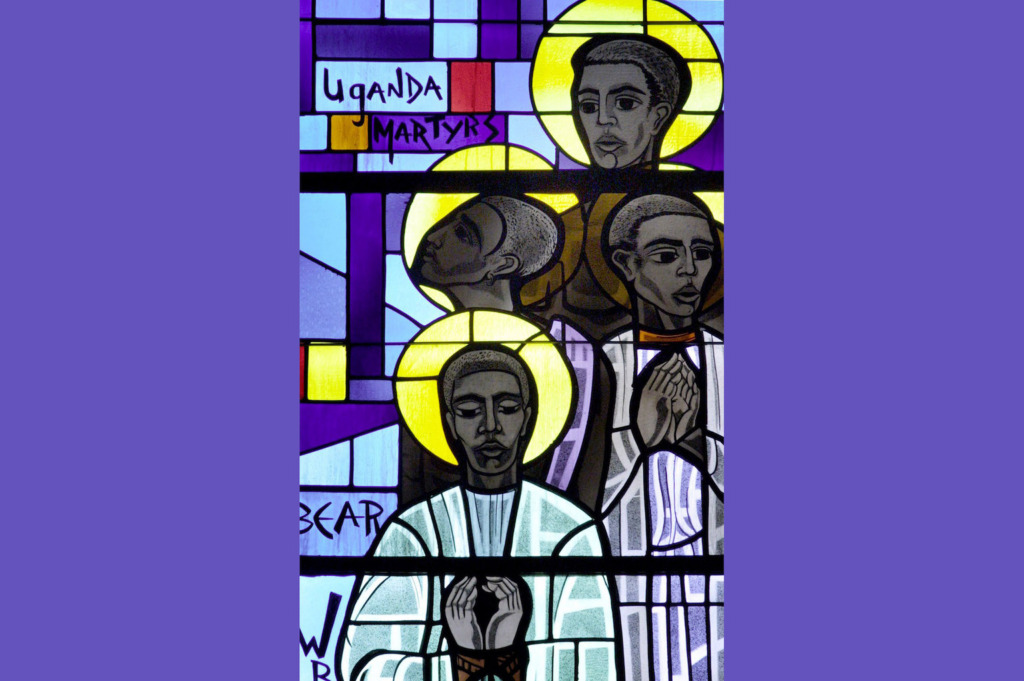A martyr is one who witnesses and suffers courageously for faith without any fear. He/she works for Christian truth and practice contrary to atheistic demands of the world. A witness of faith has two alternatives: either abandon religion or lose his/her life for it.
The Uganda Martyrs — 22 Roman Catholics and 23 Anglicans — were executed at the orders of Kabaka Mwanga between 1885 and 1887. In addition, there were two catechists, David Okello (age 16) and Jildo Irwa (age 12-14), who were killed in Paimol near Kalongo in Northern Uganda on Oct. 18, 1918. They, too, had refused to renounce the new religion of which they were catechists.
This story and journey of faith began with the arrival of the first missionaries (White Fathers or Missionaries of Africa) to Uganda, Father Simon Lourdel and Brother Amans, on Feb. 17, 1879. It reached its climax on June 3, 1886, when most of these brave young men, who in barely 10 years of discipleship had become our ancestors in faith by embracing the supreme form of witnessing to Christ — martyrdom.
They are Achilles Kiwanuka (17), Adolphus Ludigo-Mukasa (24), Ambrose Kibuuka (18), Anatoli Kiriggwajjo (20), Andrew Kaggwa (30), Athanasius Bazzekuketta (20), Bruno Sserunkuuma (30), Charles Lwanga (25), Denis Ssebuggwaawo (16), Gonzaga Gonza (24,) Gyavira Musoke (17), James Buuzaabalyaawo (25-30), Jean Marie Muzeeyi (30-35), Joseph Mukasa Balikuddembe (25), Kizito John Baptist (14), Lukka Baanabakintu (30-35), Matthias Kalemba Mulumba (50), Mbaga Tuzinde (17), Mugagga Lubowa (16), Mukasa Kiriwawanvu (20-25), Noa Mawaggali (35), and Pontian Ngondwe (25).
By killing these young men of faith, Kabaka Mwanga deluded himself. He thought that he could sweep the Christian faith away. On the contrary, he sowed the seeds which would grow and whose branches would spread out to the entire world.
This year, as we celebrate the feast day of St. Charles Lwanga and Companions on Friday, June 3, I invite you to follow their example of unshakable faith in word and deed, guided by the words of St. Paul: “For I am convinced that neither death, nor life, nor angels, nor principalities, nor present things, nor future things, nor powers, nor height, nor depth, nor any other creature will be able to separate us from the love of God in Christ Jesus our Lord” (Rom 8:38-39).
This rare dedication to the faith continues to be a challenge to Christians today. The Seven Deadly Sins have long been in our history and our media. Everyone grows up learning about them. Everyone knows what they are. Or do they?
Here is a list of deadly sins redefined for our modern world:
Envy is like a parasite. it is the most internally destructive. It will eat away at you until there is nothing left but a shell. You get what you think you want, but that want is not from desire.
Greed for money, greed for power, greed for material possessions. Whatever it is, you just need more.
Gluttony is consumption in excess to the point of being wasteful, to the point of being harmful. This can be food, drinks.
Lust can be for power, for knowledge, for money, for blood, for alcohol, for drugs, for anything. Today we live in a lust-filled world, where rape has become a culture, where adultery, masturbation and pornography are no big deal.
Pride. Beliefs, values, culture, race, gender, political standings, fashion, occupation, food preferences and everything else about someone’s identity are shoved into hierarchies of better and worse – you can be prideful of any of them.
Sloth. If you see someone getting harassed, do you step in to stop it? If you see someone who is having a hard life, do you try to brighten up their life? If you see something suspicious, do you say something? Or is it none of your business?
Wrath can be the most destructive sin on a global scale. Why? Because that is how wars begin, how the cycle of revenge can last for centuries, how one group of people can so easily demonize another to deserve “worse.”
Once St. Charles Lwanga and Companions embraced Catholicism, they stood firm never to contradict their faith. Their eyes were fixed on Jesus. Some martyrs broke the practice of polygamy, some turned their backs to unbecoming demands of the king and paid their full allegiance to Jesus. When they faced martyrdom through being beheaded, castrated, speared, ravaged by wild dogs, dismembered and burned, their love of Christ was firm!
Is your love for Christ firm?
Father Muddu is pastor of St. Mary of the Annunciation Parish, Ladysmith. You can view his video presentation about St. Charles Lwanga and Companions here.

